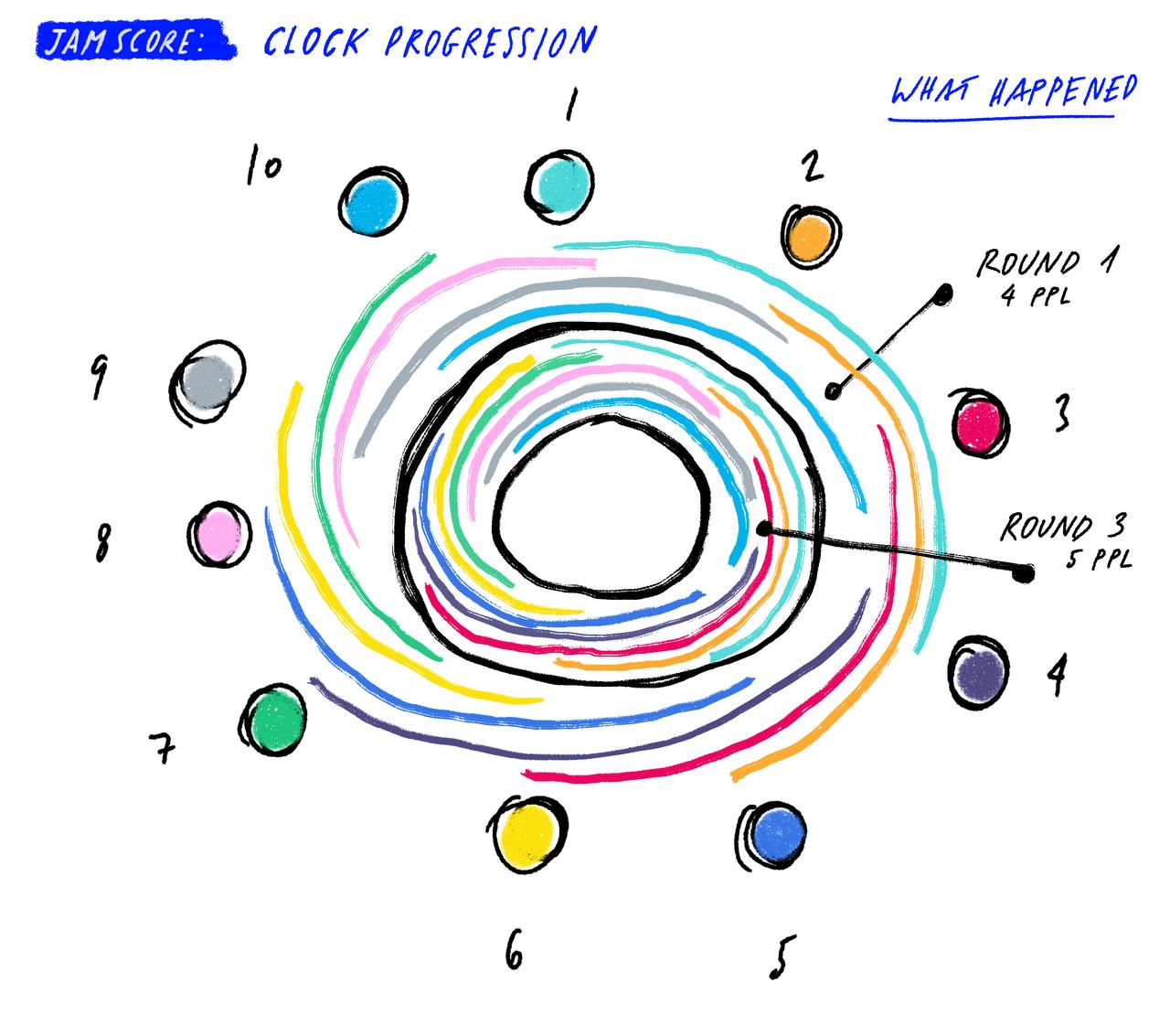Sound jams: m&m at pzi: Difference between revisions
mNo edit summary |
No edit summary |
||
| Line 13: | Line 13: | ||
==== participants ==== | ==== participants ==== | ||
mitsa, jian, kamo, miriam, alex, emma, manetta, gersande, chae, joseph [in order of the clock] | mitsa, jian, kamo, miriam, alex, emma, manetta, gersande, chae, joseph [in order of the clock] | ||
==== instruments ==== | |||
fretless electric guitar, harp, bass guitar, ukulele, paper, body percussion, dj mixer, computer, jar and pen, voices and microphone, mobile phone | |||
==== feedback & reflections ==== | ==== feedback & reflections ==== | ||
Revision as of 17:43, 11 March 2023
// 10-10-2022 // facilitated together with mitsitron
context
The jam was the first of the series in our research. As an opening one, we focused on a topic: Deep Listening (a concept brought to life by artist Pauline Oliveros). The participants were invited to read some extracts from her book with the same title and to jam while trying to apply listening and paying attention techniques to their performance in the group. The jam was following the structure of a clock while progressing.
participants
mitsa, jian, kamo, miriam, alex, emma, manetta, gersande, chae, joseph [in order of the clock]
instruments
fretless electric guitar, harp, bass guitar, ukulele, paper, body percussion, dj mixer, computer, jar and pen, voices and microphone, mobile phone
feedback & reflections
-overall: it was nice; a well-facilitated jam
-the clock structure - helps to listen to the others and move around organically; frustrating when you want to play with someone or some instrument specifically
-instruments shape the experience - some instruments (and/or for some participants) require more focus and it makes it difficult to focus on listening & responding
-improvised instructions in the middle are confusing when the sign language is not introduced ahead / to be given really clearly
-everyone playing at the same time is confusing - climbing up is better (create a slow progression)
-different instruments - different volume and space-taking - great for learning to listen and pay attention
-maybe try giving instruments to people that they never used before - to put everyone at a similar "start"
-visual score will help people without musical training or who are more visual
-warming up can include a moment to explore the instruments
-it will be better if the 5th person starts before the 1st stops
-keep doing the jams with having some of the same participants over and over again - for being able to experiment more and try different things
-don't be afraid to ask people to come to jams when you want to try out new things
learnings
What worked:
-the text in relation to the jam. Deep listening a nice starting point
-the facilitation through the clock score can be noticed when you listen to the recording
-the plethora of sounds that are produced. Strings, processed recordings, paper, voices clean and dissolved, synths, a glass of beer, a harmonica. it is a diverse improvised soundscape.
-I can hear a lot of moments of listening and responding.
What could be improved:
-take into concideration the amplitude dynamics and the complexity of each instrument. Worke more on the idea of how can the different voices take as much space as they desire while not creating an unwanted unbalance with the rest.
-reflect on how to disrupt the idea of the lone improviser.
-take into concideration the dynamics of a group with different experiences around sound and improvisation, while facilitating. How this affects each different session depending on the theme.
-if we improvise instructions or change the rules during the jam - make sure everyone understands clearly the change
-progression works well for the clock structure - we can create a score that progresses with each round
-always have two recorders working
recordings & mix
⟿ diffractive mixing - edit 1.0
zine
⟿ download the pdf zine here
⟿ download the A4 pdf for printing & folding here
wip
▶ working pad - preparation of the session
